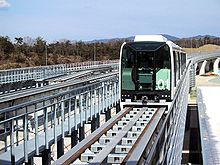Aichi Rapid Transit
| Linimo | |
|---|---|

Linimo train approaching Banpaku Kinen Koen, in the direction of Fujigaoka Station
|
|
| Overview | |
| Other name(s) | Aichi High-Speed Transit Tobu Kyuryo Line |
| Native name | Rinimo (リニモ?), formally Aichi Kōsoku Kōtsū Tōbu Kyūryō-sen (愛知高速交通東部丘陵線?) |
| Type | Rapid transit |
| Locale | Aichi Prefecture, Japan |
| Termini |
Fujigaoka Yakusa |
| Stations | 9 |
| Daily ridership | 16500 |
| Website | www |
| Operation | |
| Opened | 6 March 2005 |
| Owner | Aichi Rapid Transit Co., Ltd. (愛知高速交通株式会社 Aichi Kōsoku Kōtsū Kabushiki Gaisha?) |
| Technical | |
| Line length | 8.9 km (5.5 mi) |
| Number of tracks | 2 |
| Minimum radius | 75 m (246 ft 1 in) |
| Electrification | 1500 V DC Third rail |
| Operating speed | 100 km/h (62 mph) |
Linimo (リニモ Rinimo?), formally the Aichi High-Speed Transit Tobu Kyuryo Line (愛知高速交通東部丘陵線 Aichi Kōsoku Kōtsū Tōbu Kyūryō-sen?) is a magnetic levitation train line in Aichi Prefecture, Japan, near the city of Nagoya. While primarily built to serve the Expo 2005 fair site, the line now operates to serve the local community.
Linimo is owned and operated by Aichi Rapid Transit Co., Ltd. (愛知高速交通株式会社 Aichi Kōsoku Kōtsū Kabushiki Gaisha?) and is the first commercial maglev in Japan to use the High Speed Surface Transport (HSST) type technology. It is also the world's first unmanned commercial urban maglev. There are some sources that ambiguously describe "unmanned" as "automated" or ignore the condition while making such a claim but Linimo was actually the fourth commercial urban maglev operated in the world, predated by the Birmingham Maglev (1984-1995), the Berlin M-Bahn (1989-1991) and the Shanghai Maglev (opened in 2004).
...
Wikipedia
